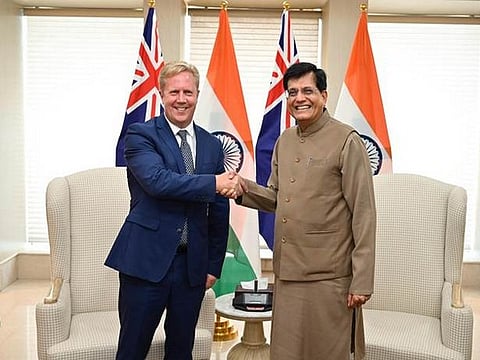India, New Zealand start talks for Free Trade Agreement
NEW DELHI: Coinciding with the visit of New Zealand Prime Minister Christopher Luxon to India from 16 to 20 March, discussions on a Free Trade Agreement (FTA) between the two nations have resumed. Both countries are also set to enhance their defence cooperation during the visit.
India and New Zealand have pursued a free trade relationship through two tracks: bilateral FTA negotiations and the Regional Comprehensive Economic Partnership (RCEP). The last formal round of talks for a bilateral agreement took place in Delhi on 17-18 February 2015.
“The two nations are pleased to announce the launch of negotiations for a comprehensive and mutually beneficial India-New Zealand Free Trade Agreement (FTA) negotiations,” a government release stated. The decision followed a meeting between Commerce and Industry Minister Piyush Goyal and New Zealand’s Minister for Trade and Investment.
“The India-New Zealand FTA negotiations are designed to achieve balanced outcomes that will enhance supply chain integration and improve market access. This initiative reflects the shared vision of both nations for a stronger economic partnership that promotes resilience, growth, and prosperity,” the release added.
The move is expected to open new avenues for cooperation, boosting trade, investment, and overall economic collaboration.
Prime Minister Luxon has repeatedly emphasised India’s importance as a growing economic and strategic power, underlining the need to strengthen bilateral cooperation. Ahead of his visit, he told New Zealand media that the “real commitment” was to deepen trade relationships.
“We’re going to do everything we can to push trade really, really hard,” Luxon stated.
India currently accounts for only 1.5 per cent of New Zealand’s exports, totalling USD 1.5 billion, with overall two-way trade between the two nations reaching USD 3.1 billion. Luxon has raised concerns over this figure, contrasting it with the nearly USD 40 billion in two-way trade New Zealand shares with China.
Strategically, India also serves as a counterbalance to China’s growing assertiveness in the region. There is significant potential for enhanced interoperability between the two nations, particularly with India operating the P-8 Poseidon aircraft. Joint training and maritime exercises are likely to be announced during the visit, further strengthening cooperation.
Regional security in the Pacific has been a growing concern in New Zealand, particularly following reports of Chinese warships navigating the Tasman Sea and the recently signed agreement between China and the Cook Islands, which took New Zealand by surprise.
In response, the New Zealand government is set to unveil its Defence Capability Plan in the coming weeks, outlining its defence spending for the next 15 years.
Luxon has referred to India as “one of the big guys,” noting that it has the fourth-largest military spending globally. He also pointed out that India is “very aligned” with New Zealand on Indo-Pacific security and suggested that both nations could increase their cooperation through more joint defence exercises.

